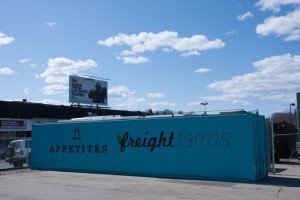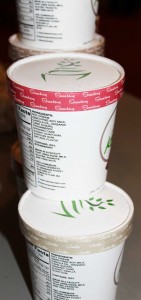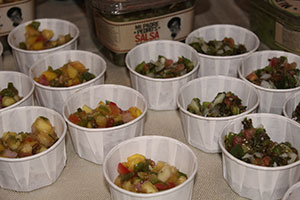Food Startup Feast Served Up at MIT Enterprise Forum
-
-
slice.mit.edu
Filed Under
Recommended

Edible lunch boxes and shipping containers as portable urban farms?
Ideas like these brought more than 275 students, faculty, alumni, and Boston-area foodies and entrepreneurs to discuss the future of food technology at From Farm to Tablet: A Food Startup Feast, a Cambridge MIT Enterprise Forum event held September 18.
“I think there’s a big shift in how we see and value food,” said panelist John Friedman, president of Freight Farms. The company repurposes shipping containers as portable urban farms that can grow an acre of food in any climate, at any time of year. “We’re making farming viable again,” he said.
In fact, an increasing number of entrepreneurs are heeding the call to innovate, and venture capitalists are taking notice. As reported in CB Insights, venture capital investments in the food tech industry are on the rise. At $350 million, 2012 investment was 37 percent higher than 2011.

Nantucket Nectars cofounder Tom First described how he and a friend transformed a simple juice business in Nantucket into the flourishing company it is today. “When I started Nantucket Nectars, not only was there no such thing as the Internet, there was no such thing as cell phones.”
Today’s startup companies may not have the same barriers to entry, but challenges still abound, said First. A surge in consumer demand for local, organic, and unprocessed food and drink places a new burden on businesses trying to expand while staying local. How can a Boston craft brewer hope to attract new customers in San Francisco if those customers will want their beer made locally?
Technological advancements can help—such as increasing shelf life or making delivery and storage easier—but consumers may resist these innovations as too complicated in their quest for simplicity in food. “From a processing perspective it’s going to be interesting to watch,” said First.
A representative from CropCircle Kitchen, a culinary incubator, described how they have helped launch more than 100 food businesses in the Boston area. AquaHarvest touted the use of new water technologies to dramatically cut down growing times, and Quantum Designs demonstrated how it is making edible food containers another part of your lunch.
“We are seeing many local food companies doing really innovative things,” said Christina Licursi, an associate at Wolf Greenfield and MIT Enterprise Forum Committee co-chair. “And they seem to be more committed to growing themselves into bigger ideas and taking bigger risks.”

The event concluded with a farmer’s market of new food startups including KEO homemade ice cream, Alex’s Ugly Sauce hot sauces, and Mi Padre Pedro's salsa and guacamole.
Yum.







